All things considered, you could be forgiven for thinking that collecting records in the 21st century was a foolish pursuit; after all, aren’t they inferior to modern digital formats such as high-fidelity digital streaming or even old-fashioned CDs?
The vinyl medium certainly has its short-comings, including potential scratches, pops & clicks, distortion from mistracking, inner groove distortion, the need to control vibrations, audible rumble, potential wow and flutter, groove wear over time, and much more.
However, despite the downsides and the lack of convenience, record sales continue to rise year-on-year. In fact, 49.61 million records were sold in the US alone last year (up from 43.46 million in 2022).
The growth over recent years has been nothing short of spectacular, with vinyl records being the only format of music available that has consistently recorded positive sales growth from 2009 onwards. Growth skyrocketed even further during 2020 and continues to grow year-on-year.
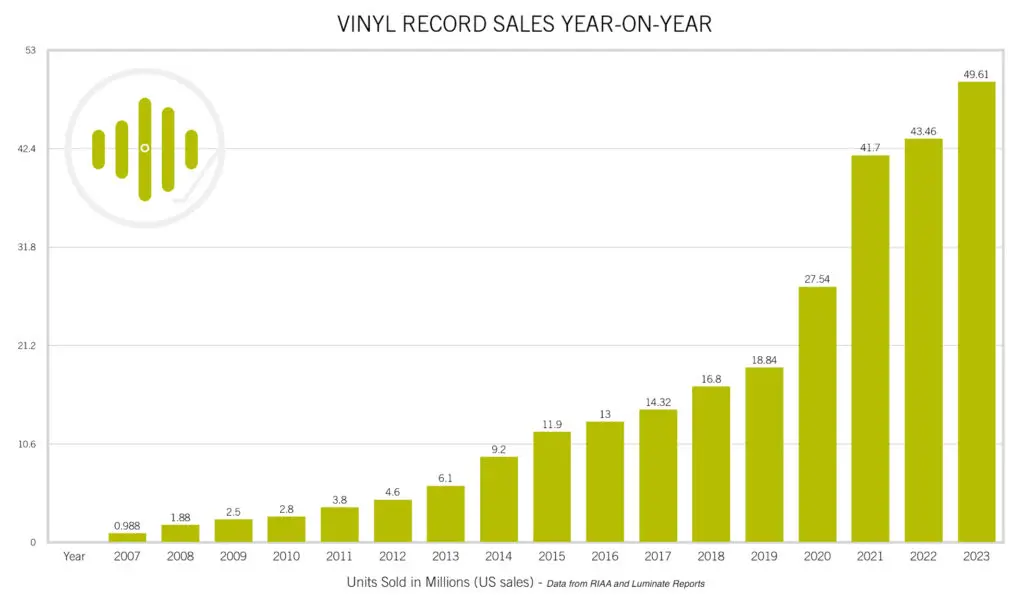
So what’s going on here? All you have to do is pay your monthly Spotify subscription, and you’ll instantly have access to (almost) any music you want. Why go to the expense and inconvenience of collecting and storing a physical record collection—particularly when the format has so many physical quirks and flaws?
I believe that something much more than simple nostalgia is going on here, particularly considering that nearly 3.5 million units of records sold in 2023 were attributed to Taylor Swift.
So what’s really driving such passion for a format once thought confined to the dustbin of history?
Naturally, each person will have their own very personal reasons, but there are some common patterns that I’ve noticed as someone who runs a publication for record collectors. Here are my thoughts:
Many Music Fans Still Want to Own Their Collection
Many music fans, like myself, still want to own the music they love rather than merely rent it from a streaming platform.
Yes, there’s the convenience of abundant and almost limitless choice, and the benefit of saving A LOT of space in your home, but you don’t own the music, and they can change the rules at any time.
In fact, just recently, the streaming platform Deezer announced it had removed 26m tracks to ‘declutter the platform’.
Of these 26 million tracks, many were noise tracks and fake artists, but it also includes tracks that haven’t been listened to in the past 12 months.
While that might not seem alarming, it’s a stark reminder that you’re not in control here. What happens if someone, for example, takes political objection to a band or track that you enjoy listening to? They can and have removed tracks before, and it will undoubtedly happen in the future.
Alternatively, many albums simply aren’t available on streaming platforms. Take the album For Those In Love by Dinah Washington, for example, from my personal collection. There’s plenty of Washington’s material available on my Tidal streaming account, just not this particular release, which I happen to love.
If you own it, it’s yours for life. Regardless of what streaming platforms might do in the future.
The Perceived Value of Music
Closely related to the above is the fact we ascribe more value to things as soon as we own them.
Psychologists summarise this as the “Endowment effect”, which is the belief that people ascribe more value to things as soon as they own them.
Our attachment to physical items starts early in life; the idea that we can own “a thing” like an extension of ourselves is one that children grasp by the age of two. And by six, they exhibit the ‘Endowment effect’.
I know from personal experience that music became much less meaningful and fulfilling for me when, back in the early 2000s, I uploaded all my music to iTunes and proceeded to listen only to digital files, for example.
Digital streaming compounds these feelings even further, ultimately driving me back to collecting physical music once again.
Choice Paralysis
Have you ever opened a streaming platform, be it Spotify, Tidal, Netflix, or any other, and felt overwhelmed and unable to make a choice?
Perhaps, like me, you’ve spent hours scrolling endlessly, searching for something to listen to or watch without any idea of where to start; in the end, you simply choose nothing!
It’s often the case that when we’re presented with such abundance of choice (almost limitless), it leads to choice paralysis: or the paradox of choice: In other words, people get overwhelmed when they are presented with many options.
With this in mind, I’ve found that by limiting choice through my record collection, I actually play more music than if I default to streaming platforms.
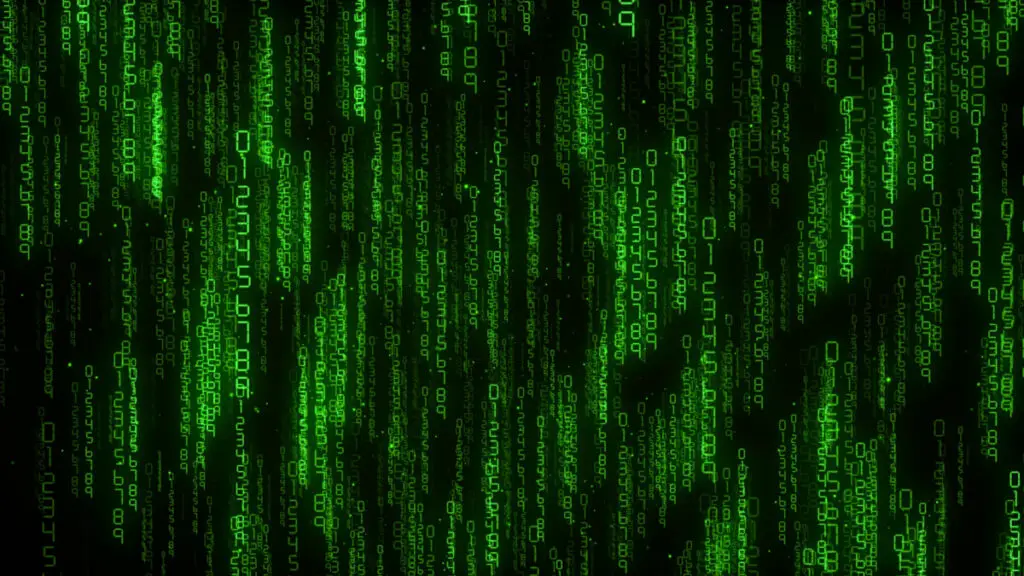
Digital is Too Perfect?
One other aspect that I find draws many listeners back to records is a feeling that digital formats are almost too perfect, and therefore, perhaps a little clinical.
I completely relate to this, and I actually feel vinyl as a format is far more successful at speaking to our humanity.
At risk of going off on a slight tangent here, it reminds me of a quote from The Matrix where in one scene featuring Agent Smith he describes the first matrix as being 100% perfect.
Here’s the quote:
“Did you know that the first Matrix was designed to be a perfect human world? Where none suffered, where everyone would be happy. It was a disaster. No one would accept the program. Entire crops were lost. Some believed we lacked the programming language to describe your perfect world. But I believe that, as a species, human beings define their reality through suffering and misery. The perfect world was a dream that your primitive cerebrum kept trying to wake up from. Which is why the Matrix was redesigned to this: the peak of your civilization.”
Agent Smith
In a roundabout way, there’s a sense that digital formats are almost too perfect and cannot speak to the frailty of our human condition in the same way a physical medium like vinyl can.
Undoubtedly, the most powerful quote to express such a feeling is John Peel’s “surface noise” statement.
“Somebody was trying to tell me that CDs are better than vinyl because they don’t have any surface noise. I said, ‘Listen, mate, life has surface noise.” – John Peel
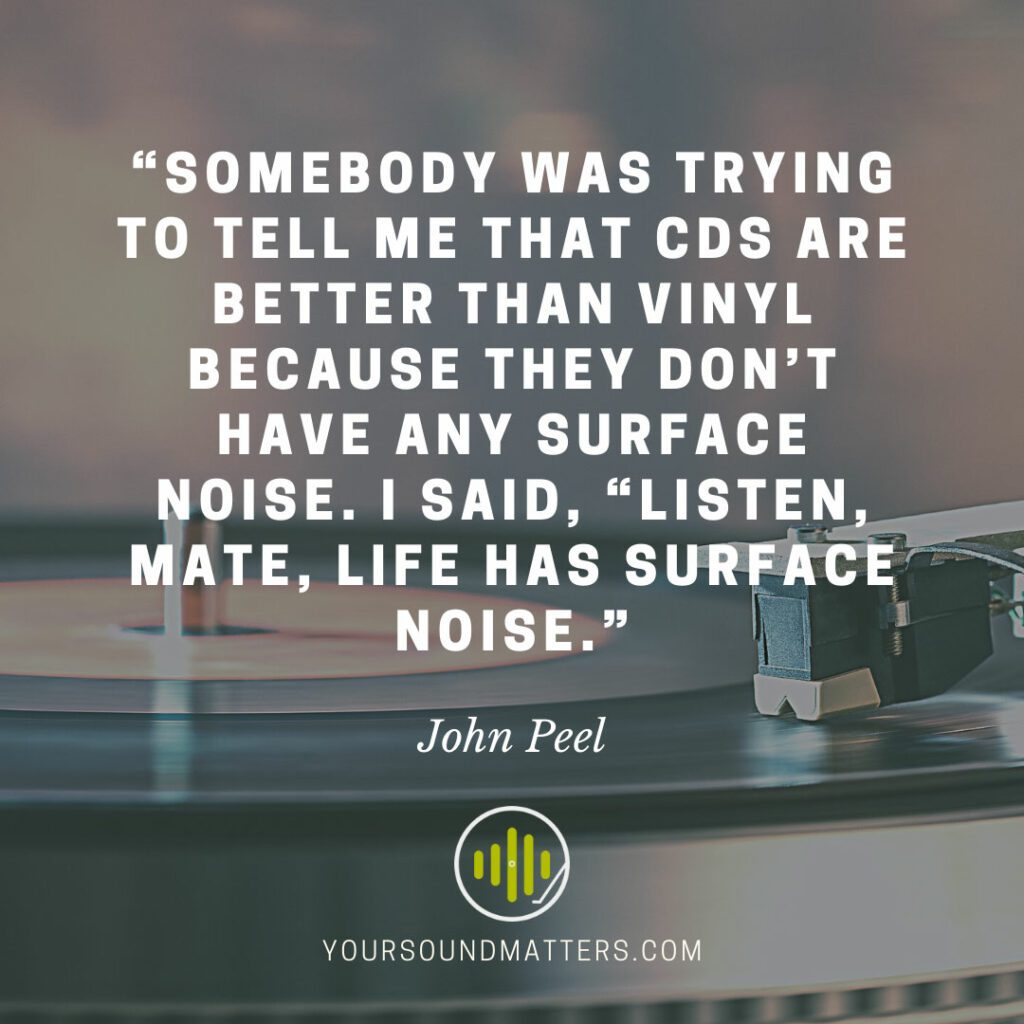
Supporting the Artist
It’s a well-known fact that streaming simply doesn’t pay artists very well – especially independent artists.
Just recently, smaller artists were handed another blow to an already dire situation when Spotify announced it was removing revenue sharing from tracks with less than one thousand streams.
The announcement came under fire from the United Musicians and Allied Workers on X (Twitter), for disproportionately affecting smaller artists.
Streaming simply doesn’t pay for smaller artists, meaning they have to find other ways to generate revenue, and of course, physical record sales can play a part in this.
If you want to support smaller artists: buy the records, consider some merchandise, and go to the concerts.
Creative Album Art
We’ve lost so much of the magic in album art over the transition to digital streaming, first with the smaller canvas of CDs and, of course, now by reducing album covers to little more than a thumbnail image.
Naturally, this is a huge attribute of the vinyl medium and a big draw in its appeal. But it goes much further than pretty images. Every aspect of a record release can form part of the artist’s canvas, so while this includes the obvious canvas extension with gatefold LP releases (or even double gatefolds), the real magic comes in the creativity of artists to play into the format in a unique way.
Take releases like Sticky Fingers, for example, with its classic Andy Warhol album cover design featuring a working zipper. Or perhaps even the likes of Led Zeppelin III and its rotatable front-cover design. The vinyl medium naturally lends itself to being an amazing canvas for creative expression beyond the music.
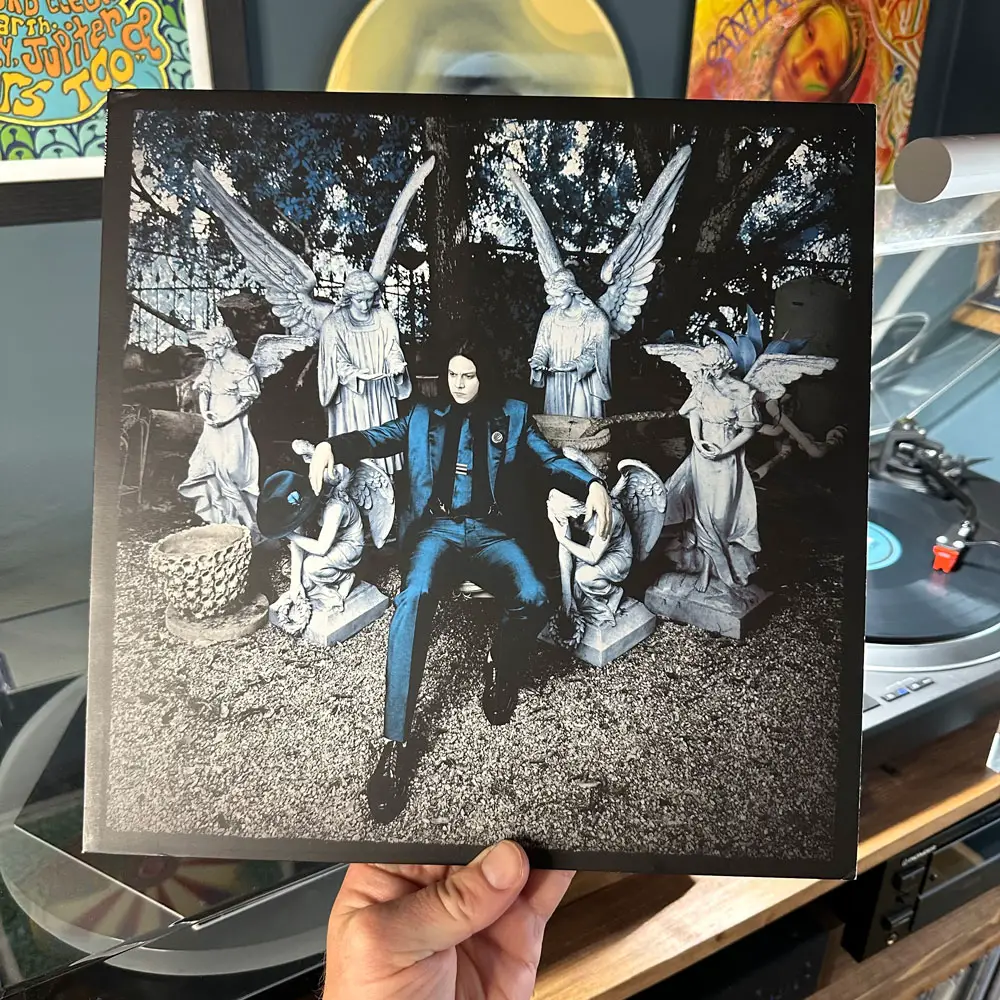
More recently, Jack White Lazaretto even featured a hologram etched into the label as a creative touch alongside many other imaginative ideas featured across the record.
The only limit when it comes to designing amazing album artwork that really stands out is your imagination. So much of this creativity is simply lost in the digital realm.
The Therapeutic Process & Downtime
In our fast-paced digital world, the ritual of collecting and playing records can act as a type of theory, offering much-needed downtime and escape from the endless screens of modern life.
Playing records is a fantastic way to step back, unplug, and unwind. In doing so, you might just find you unwind so much more of an evening than you might otherwise have done so by scrolling through your phone while streaming music passively in the background.
Not everyone sees it this way, though, as a recent social media comment on our Facebook page shows:
Most people, however, even if they’re not collectors themselves can see how for many music fans, the format offers more than just music, it offers a type of therapy and escape. The great news is, in today’s world, you can enjoy the convenience of streaming while embracing the beauty of records to whatever degree you like or can afford.
The Bottom Line
With the above in mind, I would conclude that collecting and playing records can act as the perfect antidote to many of the downsides of our digital age.
Our digital world has brought us so many benefits and conveniences, but it’s equally essential and healthy to unplug occasionally.
These are just some of the many reasons why I personally continue to collect records to this day and why so many others continue to connect with an “obsolete” format—warts and all. Was the age of vinyl the peak of our civilization? Perhaps so.

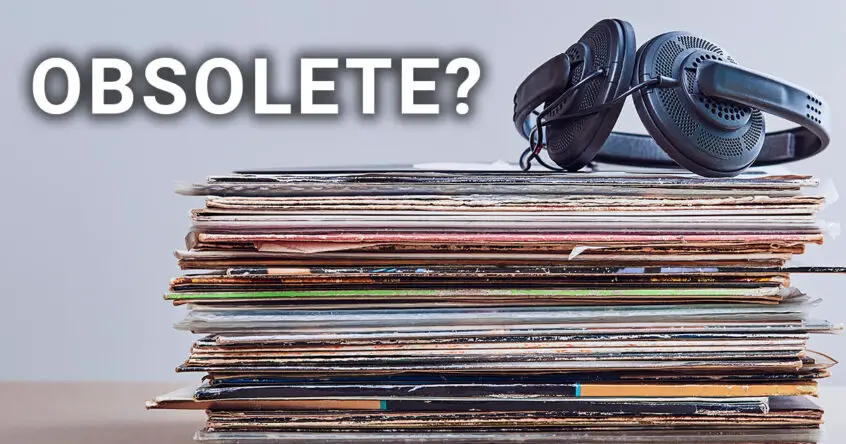


As a lifelong collector of records that started with 2 LP’s at 13 to over 5500 at 70, I found Mark’s take on vinyl interesting. Records shaped my listening patterns and broadened my appreciation for different styles of music. Some of the collection has been duplicated on CD but none has been downloaded and saved. I will listen to things on youtube if I’m on the computer for convenience and ease of finding an album that is not in the house. As to the CD vs LP argument-which sounds better. On the whole CD wins because most turntable systems cannot reproduce the music properly because of their mats. Cartridges play a role in extracting detail and they do improve things if you have a really good one. CD’s are more compact with longer running times. I recently did a Beethoven symphony marathon. All 9 require 5 CD’s. The DG box set has 8 records in it. These 1977 recordings sound fabulous and there is a very comprehensive booklet included. The CD set was given to a friend who had a long drive to get home. With music it is not about the format that presents it but the content that you are listening to.
If you don’t have the internet, you can’t stream music, whether it be on your phone, computer, or HEOS streaming devices. I can pass on to my children my 300+ album collection and they can enjoy them for years to come, along with all of the equipment. Vinyl isn’t for everyone or is a digital CD. At least we have choices.
The reason I listen to Vinyl vs digital. Digital is artificial using a square wave, meaning it stops & goes & on the stop, just a very tiny piece of the music is missing. Vinyl follows natural order the music is continuous meaning the music information is all there moving in circles. It is Nature & Physics.
You have encapsulated it perfectly why we collect and love to play records. There is a record shop owner in the NW who produces a video on Facebook every Saturday before opening his shop. He greets his viewers every time with – Good morning and I hope you have been enjoying your records!
One of the biggest reasons I love having vinyl is the liner notes that came with albums. Reading the band members, guest artists, songwriters, producers, engineers etc.was and still is one of the extremely fascinating parts of the whole vinyl experience. The music from the 70’s is incredible and I couldn’t imagine works such as Thick as a Brick or Quadrophenia without all the extra reading material that was included with the music on the album.
Top subject Mark. My wife just doesn’t “get it” when it comes to my collecting vinyl! Your comments are just so spot-on, maybe I should make this video compulsory viewing for her…. Perhaps then she would understand why a display of records in a shop is such a magnet for me!
I love your article on why we collect vinyl records and some of the reasons are true and valid.But to me and many vinyl lovers the most compelling reason is sound,it just sounds more natural more alive and no other recorded medium can Mitch it except open real tape.I hope you can write a piece on sound that vinyl just gets it write.
Some people will always prefer CDs. Some people will always prefer vinyl. That’s just the way it is. Get a small group together and do a blind test. See what happens.